-
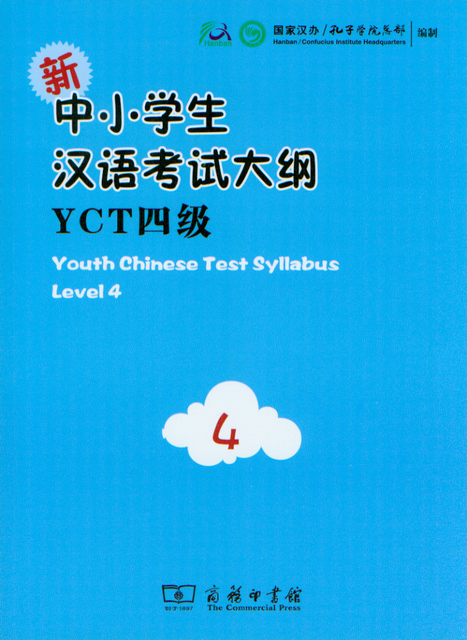 新中小学生汉语考试(YCT)是一项国际汉语能力标准化考试,考查汉语非第一语言的中小学生日常生活和学习中运用汉语的能力。新YCT分笔试和口试两部分。笔试包括YCT(一级)、YCT(二级)、YCT(三级)、YCT(四级);口试包括YCT(初级)和YCT(中级)。YCT(四级)考查考生的日常汉语应用能力,它对应于《国际汉语能力标准》二级、《欧洲语言共同参考柜架(CEF)》B1级。通过YCT(四级)的考生可以用汉语完成生活、学习中的基本交际任务,在中国旅游时,可应对遇到的大部分交际任务。 The Youth Chinese Test (YCT) is an international standardised Chinese language proficiency test that tests the ability of primary and secondary school students whose Chinese is not their first language to use Chinese in their daily lives and studies. The new YCT has two parts: a written test and an oral test. The written test includes YCT (Level 1), YCT (Level 2), YCT (Level 3) and YCT (Level 4); the oral test includes YCT (Elementary) and YCT (Intermediate). YCT (Level 4) tests candidates' ability to use Chinese in everyday life. It corresponds to Level 2 of the International Chinese Language Proficiency Standard and Level B1 of the Common European Framework of Reference for Languages (CEF). Candidates who pass the YCT (Level 4) can use Chinese to perform basic communicative tasks in their lives and studies, and can cope with most of the communicative tasks they encounter when travelling in China.
新中小学生汉语考试(YCT)是一项国际汉语能力标准化考试,考查汉语非第一语言的中小学生日常生活和学习中运用汉语的能力。新YCT分笔试和口试两部分。笔试包括YCT(一级)、YCT(二级)、YCT(三级)、YCT(四级);口试包括YCT(初级)和YCT(中级)。YCT(四级)考查考生的日常汉语应用能力,它对应于《国际汉语能力标准》二级、《欧洲语言共同参考柜架(CEF)》B1级。通过YCT(四级)的考生可以用汉语完成生活、学习中的基本交际任务,在中国旅游时,可应对遇到的大部分交际任务。 The Youth Chinese Test (YCT) is an international standardised Chinese language proficiency test that tests the ability of primary and secondary school students whose Chinese is not their first language to use Chinese in their daily lives and studies. The new YCT has two parts: a written test and an oral test. The written test includes YCT (Level 1), YCT (Level 2), YCT (Level 3) and YCT (Level 4); the oral test includes YCT (Elementary) and YCT (Intermediate). YCT (Level 4) tests candidates' ability to use Chinese in everyday life. It corresponds to Level 2 of the International Chinese Language Proficiency Standard and Level B1 of the Common European Framework of Reference for Languages (CEF). Candidates who pass the YCT (Level 4) can use Chinese to perform basic communicative tasks in their lives and studies, and can cope with most of the communicative tasks they encounter when travelling in China. -
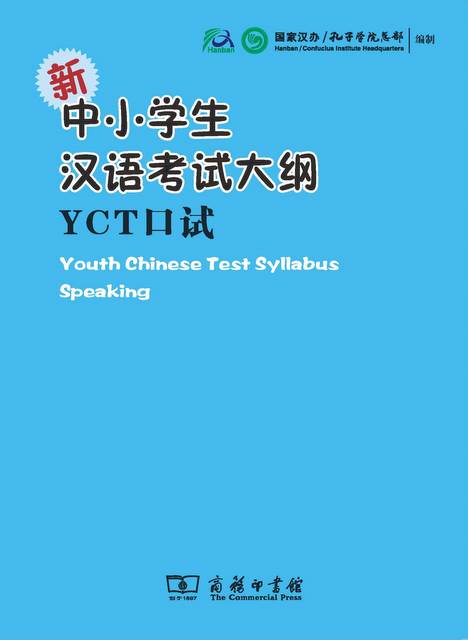 新中小学生汉语考试(YCT)是一项国际汉语能力标准化考试,考查汉语非第一语言的中小学生日常生活和学习中运用汉语的能力。新YCT分笔试和口试两部分。笔试包括YCT(一级)、YCT(二级)、YCT(三级)、YCT(四级);口试包括YCT(初级)和YCT(中级)。 YCT口试考查考生的汉语口头表达能力,分初级、中级两个等级。 通过初级的考生可以听懂并用汉语口头表达较为熟悉的日常汉语,满足基本交际需求。词汇量约200个。 通过中级的考生可以听懂并用汉语与汉语为母语者进行简单的口头交流。词汇量约400个。 The Youth Chinese Test (YCT) is an international standardised Chinese language proficiency test that tests the ability of primary and secondary school students whose Chinese is not their first language to use Chinese in their daily lives and studies. The new YCT has two parts: a written test and an oral test. The written test includes YCT (Level 1), YCT (Level 2), YCT (Level 3) and YCT (Level 4); the oral test includes YCT (Elementary) and YCT (Intermediate). YCT (Level 1) tests candidates' ability to use Chinese in everyday life. The YCT oral examination tests candidates' ability to express themselves orally in Chinese, and is divided into two levels: elementary and intermediate. Candidates who pass the elementary level can understand and verbalise in Chinese the more familiar everyday Chinese language to meet basic communicative needs. The vocabulary is approximately 200 words. Intermediate candidates can understand and communicate verbally with native speakers of Chinese in a simple manner. The vocabulary is approximately 400 words.
新中小学生汉语考试(YCT)是一项国际汉语能力标准化考试,考查汉语非第一语言的中小学生日常生活和学习中运用汉语的能力。新YCT分笔试和口试两部分。笔试包括YCT(一级)、YCT(二级)、YCT(三级)、YCT(四级);口试包括YCT(初级)和YCT(中级)。 YCT口试考查考生的汉语口头表达能力,分初级、中级两个等级。 通过初级的考生可以听懂并用汉语口头表达较为熟悉的日常汉语,满足基本交际需求。词汇量约200个。 通过中级的考生可以听懂并用汉语与汉语为母语者进行简单的口头交流。词汇量约400个。 The Youth Chinese Test (YCT) is an international standardised Chinese language proficiency test that tests the ability of primary and secondary school students whose Chinese is not their first language to use Chinese in their daily lives and studies. The new YCT has two parts: a written test and an oral test. The written test includes YCT (Level 1), YCT (Level 2), YCT (Level 3) and YCT (Level 4); the oral test includes YCT (Elementary) and YCT (Intermediate). YCT (Level 1) tests candidates' ability to use Chinese in everyday life. The YCT oral examination tests candidates' ability to express themselves orally in Chinese, and is divided into two levels: elementary and intermediate. Candidates who pass the elementary level can understand and verbalise in Chinese the more familiar everyday Chinese language to meet basic communicative needs. The vocabulary is approximately 200 words. Intermediate candidates can understand and communicate verbally with native speakers of Chinese in a simple manner. The vocabulary is approximately 400 words. -
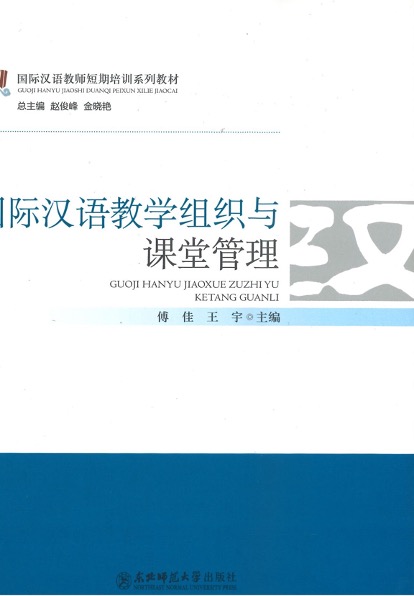 《国际汉语教师短期培训系列教材 国际汉语教学组织与课堂管理》按照对外汉语教学全过程的四个基本环节,选编了“总体设计”、“教材编写”、“课堂教学”和“语言测试评估”四个方面的基础理论知识,以及国际汉语教师急需吸收、转化、应用的教学理论。由于本部分的实践性较强,因此,编者编写、汇集、整理了许多具有针对性、代表性的课堂教学案例和实践活动,给国际汉语教师和志愿者提供了具体实用、易于劋作、效果明显的课堂教学方法与基本技巧。同时,《国际汉语教师短期培训系列教材 国际汉语教学组织与课堂管理》特别设计了教学实践活动的练习部分及国际汉语教师资格考试的模拟题,方便教材使用者进行自测。 The textbook is based on the four basic aspects of teaching Chinese as a foreign language, including "general design", "writing teaching materials", "classroom teaching" and "language testing and assessment". "It also contains the basic theoretical knowledge in the four areas of language testing and assessment, as well as the teaching theories that international Chinese language teachers need to absorb, translate and apply. As this part is more practical in nature, the editors have prepared, assembled and collated many relevant and representative classroom teaching cases and practical activities, providing international Chinese language teachers and volunteers with concrete and practical classroom teaching methods and basic techniques that are easy to put into practice and have obvious effects. At the same time, the textbook is specially designed with exercises for practical activities and mock questions for the International Chinese Language Teachers' Qualifying Examination, so that users can take self-assessments.
《国际汉语教师短期培训系列教材 国际汉语教学组织与课堂管理》按照对外汉语教学全过程的四个基本环节,选编了“总体设计”、“教材编写”、“课堂教学”和“语言测试评估”四个方面的基础理论知识,以及国际汉语教师急需吸收、转化、应用的教学理论。由于本部分的实践性较强,因此,编者编写、汇集、整理了许多具有针对性、代表性的课堂教学案例和实践活动,给国际汉语教师和志愿者提供了具体实用、易于劋作、效果明显的课堂教学方法与基本技巧。同时,《国际汉语教师短期培训系列教材 国际汉语教学组织与课堂管理》特别设计了教学实践活动的练习部分及国际汉语教师资格考试的模拟题,方便教材使用者进行自测。 The textbook is based on the four basic aspects of teaching Chinese as a foreign language, including "general design", "writing teaching materials", "classroom teaching" and "language testing and assessment". "It also contains the basic theoretical knowledge in the four areas of language testing and assessment, as well as the teaching theories that international Chinese language teachers need to absorb, translate and apply. As this part is more practical in nature, the editors have prepared, assembled and collated many relevant and representative classroom teaching cases and practical activities, providing international Chinese language teachers and volunteers with concrete and practical classroom teaching methods and basic techniques that are easy to put into practice and have obvious effects. At the same time, the textbook is specially designed with exercises for practical activities and mock questions for the International Chinese Language Teachers' Qualifying Examination, so that users can take self-assessments. -
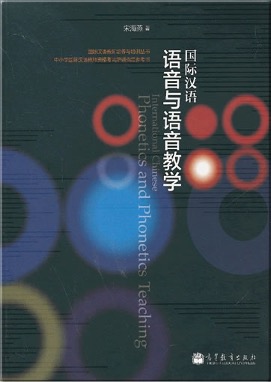 国际汉语教师培养与培训丛书主要面向国内外从事国际汉语教学的教师,也适用于汉语国际教育及相关专业的学生,以及有志于从事中小学国际汉语教学的其他人员,可用作专业课教材、教师培训、个人自学等。《国际汉语教师培养与培训丛书·国际汉语:语音与语音教学》立足于国际汉语教育实践,从具有前瞻性的国际化视角入手,在图书定位、丛书构成、编写理念、框架体例等各个方面都进行了尝试和创新,以期实现“教学入门——教学实践——教学思考——教学创新”四步走的目标,最终提高国际汉语教师的教学素质和教学水平。本丛书有四大特色: 1.普及和巩固基础知识 2介绍和学习基本理论 3.了解和掌握基本方法 4.培养和提升教学能力 It is also suitable for students of Chinese language education and related majors, as well as other people who are interested in teaching Chinese as a foreign language in primary and secondary schools, and can be used as teaching materials for professional courses, teacher training and personal study. The book is based on the practice of international Chinese language education and is written from a forward-looking international perspective, with attempts and innovations made in various aspects such as book positioning, series composition, writing concept and framework, with a view to realizing the concept of "Introduction to Teaching - Teaching Practice - Teaching Thinking - Teaching. -It is intended to achieve the goal of "teaching introduction - teaching practice - teaching reflection - teaching innovation" in four steps, and ultimately improve the teaching quality and level of international Chinese teachers. This series has four main features. 1. Popularisation and consolidation of basic knowledge 2. Introduce and learn the basic theories 3. understanding and mastering basic methods 4. Cultivate and enhance teaching ability
国际汉语教师培养与培训丛书主要面向国内外从事国际汉语教学的教师,也适用于汉语国际教育及相关专业的学生,以及有志于从事中小学国际汉语教学的其他人员,可用作专业课教材、教师培训、个人自学等。《国际汉语教师培养与培训丛书·国际汉语:语音与语音教学》立足于国际汉语教育实践,从具有前瞻性的国际化视角入手,在图书定位、丛书构成、编写理念、框架体例等各个方面都进行了尝试和创新,以期实现“教学入门——教学实践——教学思考——教学创新”四步走的目标,最终提高国际汉语教师的教学素质和教学水平。本丛书有四大特色: 1.普及和巩固基础知识 2介绍和学习基本理论 3.了解和掌握基本方法 4.培养和提升教学能力 It is also suitable for students of Chinese language education and related majors, as well as other people who are interested in teaching Chinese as a foreign language in primary and secondary schools, and can be used as teaching materials for professional courses, teacher training and personal study. The book is based on the practice of international Chinese language education and is written from a forward-looking international perspective, with attempts and innovations made in various aspects such as book positioning, series composition, writing concept and framework, with a view to realizing the concept of "Introduction to Teaching - Teaching Practice - Teaching Thinking - Teaching. -It is intended to achieve the goal of "teaching introduction - teaching practice - teaching reflection - teaching innovation" in four steps, and ultimately improve the teaching quality and level of international Chinese teachers. This series has four main features. 1. Popularisation and consolidation of basic knowledge 2. Introduce and learn the basic theories 3. understanding and mastering basic methods 4. Cultivate and enhance teaching ability -
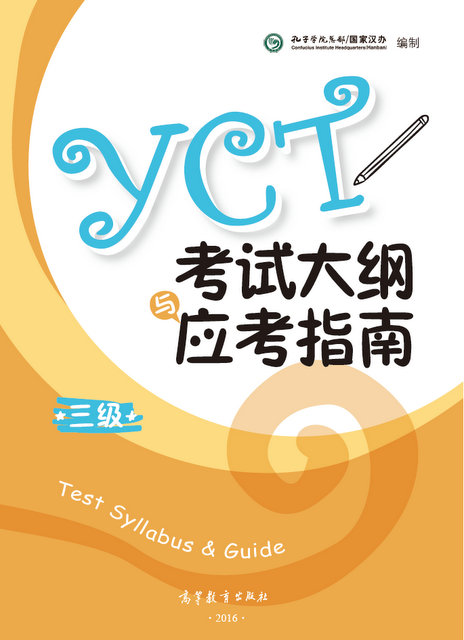 中小学生汉语考试(YCT)自2010年实施以来,更加关注汉语非第一语言的学习者综合能力的培养,多元智能发展的培养。《YCT考试大纲与应考指南》是基于《YCT考试大纲(2009版)》的一次修订。本次修订继续遵循“考教结合”的理念,根据主题式教学和任务型教学的理论及方法,以交际话题和语言任务为引领,重点描述学生在每一级别的词语、语言点限定内“能做(can do)”什么,建议在实际教学中,整体培养学习者的交际能力和语言综合运用能力。 Since its implementation in 2010, the Youth Chinese Test (YCT) has paid more attention to the cultivation of comprehensive abilities and the development of multiple intelligences for learners whose Chinese is not their first language. The YCT Syllabus and Examination Guide is a revision of the YCT Syllabus (2009 Edition). The revision continues to follow the concept of 'teaching and learning together', and is based on the theories and methods of topic-based teaching and task-based teaching, using communicative topics and language tasks as a guide. It is recommended that in practice, learners develop their communicative competence and their ability to use the language as a whole.
中小学生汉语考试(YCT)自2010年实施以来,更加关注汉语非第一语言的学习者综合能力的培养,多元智能发展的培养。《YCT考试大纲与应考指南》是基于《YCT考试大纲(2009版)》的一次修订。本次修订继续遵循“考教结合”的理念,根据主题式教学和任务型教学的理论及方法,以交际话题和语言任务为引领,重点描述学生在每一级别的词语、语言点限定内“能做(can do)”什么,建议在实际教学中,整体培养学习者的交际能力和语言综合运用能力。 Since its implementation in 2010, the Youth Chinese Test (YCT) has paid more attention to the cultivation of comprehensive abilities and the development of multiple intelligences for learners whose Chinese is not their first language. The YCT Syllabus and Examination Guide is a revision of the YCT Syllabus (2009 Edition). The revision continues to follow the concept of 'teaching and learning together', and is based on the theories and methods of topic-based teaching and task-based teaching, using communicative topics and language tasks as a guide. It is recommended that in practice, learners develop their communicative competence and their ability to use the language as a whole. -
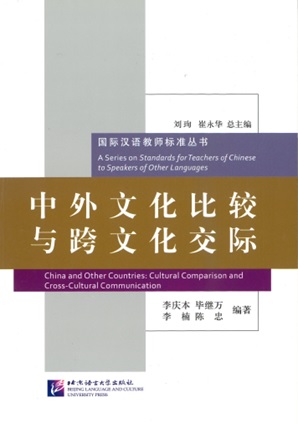 本书根据国家汉办发布的《国际汉语教师标准》中的“标准四:中外文化比较与跨文化交际”编写而成,旨在帮助国际汉语教师了解中外文化的主要异同,理解跨文化交际的主要概念,以及文化、跨文化对语言教与学的影响,并将上述理论和知识应用于教学实践中。 全书共分八章,分别介绍了中外文明的特点和历史,世界主要哲学派别及代表人物,国外汉学研究,中外社会价值观及国外主要文化风俗,跨文化交际学与第二语言教学之间的关系,语用学与语言教学的关系等相关内容。本书内容的选取、论述的角度以及课后“思考与练习”部分的设计,都与国际汉语教师的教学实践紧密相连,具有较强的可操作性和针对性。 This book is based on Standard IV: Comparison of Chinese and Foreign Cultures and Intercultural Communication of the International Standards for Chinese Language Teachers issued by the Hanban. The book is divided into eight chapters. The book is divided into eight chapters, which introduce the characteristics and history of Chinese and foreign civilizations, the major philosophical schools and figures in the world, the study of Chinese studies abroad, Chinese and foreign social values and major foreign cultural customs, the relationship between intercultural communication studies and second language teaching, and the relationship between pragmatics and language teaching. The selection of content, the angle of discussion, and the design of the "Reflections and Exercises" section at the end of the course are closely related to the teaching practice of international Chinese teachers, and are highly operable and relevant.
本书根据国家汉办发布的《国际汉语教师标准》中的“标准四:中外文化比较与跨文化交际”编写而成,旨在帮助国际汉语教师了解中外文化的主要异同,理解跨文化交际的主要概念,以及文化、跨文化对语言教与学的影响,并将上述理论和知识应用于教学实践中。 全书共分八章,分别介绍了中外文明的特点和历史,世界主要哲学派别及代表人物,国外汉学研究,中外社会价值观及国外主要文化风俗,跨文化交际学与第二语言教学之间的关系,语用学与语言教学的关系等相关内容。本书内容的选取、论述的角度以及课后“思考与练习”部分的设计,都与国际汉语教师的教学实践紧密相连,具有较强的可操作性和针对性。 This book is based on Standard IV: Comparison of Chinese and Foreign Cultures and Intercultural Communication of the International Standards for Chinese Language Teachers issued by the Hanban. The book is divided into eight chapters. The book is divided into eight chapters, which introduce the characteristics and history of Chinese and foreign civilizations, the major philosophical schools and figures in the world, the study of Chinese studies abroad, Chinese and foreign social values and major foreign cultural customs, the relationship between intercultural communication studies and second language teaching, and the relationship between pragmatics and language teaching. The selection of content, the angle of discussion, and the design of the "Reflections and Exercises" section at the end of the course are closely related to the teaching practice of international Chinese teachers, and are highly operable and relevant. -
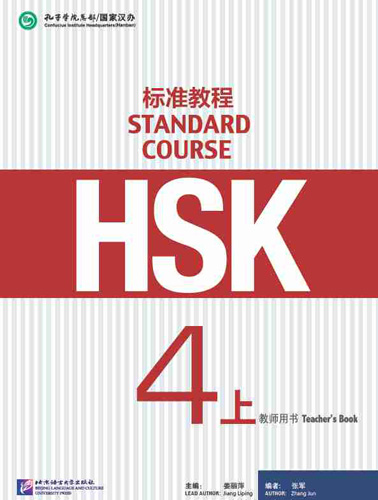 《HSK标准教程》经国家汉办授权,由北京语言大学出版社联合汉考国际(CTI)共同研发,将HSK真题作为基本素材,以自然幽默的风格、亲切熟悉的话题、科学严谨的课程设计,实现了与HSK考试内容、形式及等级水平的全方位对接,是一套充分体现“考教结合、以考促学、以考促教”理念的新型汉语教材。既适用于各国孔子学院,也适用于其他汉语教学机构和个人自学。 本书为4级上教师用书,共设10课,每课含教学内容和教学目标说明、教学步骤解析,并附练习册听力文本及参考答案。可为教师使用对应级别教程及练习册提供全方位的教学指导和有效的教学支持。
《HSK标准教程》经国家汉办授权,由北京语言大学出版社联合汉考国际(CTI)共同研发,将HSK真题作为基本素材,以自然幽默的风格、亲切熟悉的话题、科学严谨的课程设计,实现了与HSK考试内容、形式及等级水平的全方位对接,是一套充分体现“考教结合、以考促学、以考促教”理念的新型汉语教材。既适用于各国孔子学院,也适用于其他汉语教学机构和个人自学。 本书为4级上教师用书,共设10课,每课含教学内容和教学目标说明、教学步骤解析,并附练习册听力文本及参考答案。可为教师使用对应级别教程及练习册提供全方位的教学指导和有效的教学支持。Authorized by Hanban, HSK Standard Course is developed under the joint efforts of Beijing Language and Culture University Press and Chinese Testing International (CTI). With HSK test papers as its primary source, HSK Standard Course is characterized by a humorous style, familiar topics and a scientific course design. Matching the HSK test in all aspects, from the content, form to the levels, it is a series of new-type course books embodying the idea of “combining testing and teaching, and promoting learning and teaching by testing”. It is suitable for the Confucius Institutes in different countries as well as other Chinese teaching institutions and self-taught learners.
This is Teacher’s Book 4A, with altogether 10 lessons. Each lesson includes a specification of the instructional contents and objectives, an elaboration of teaching steps, and the listening scripts and reference answers for the Workbook as well. It provides teachers with all-round guidance and effective support in regard to how to use the textbook and workbook of the corresponding level. -
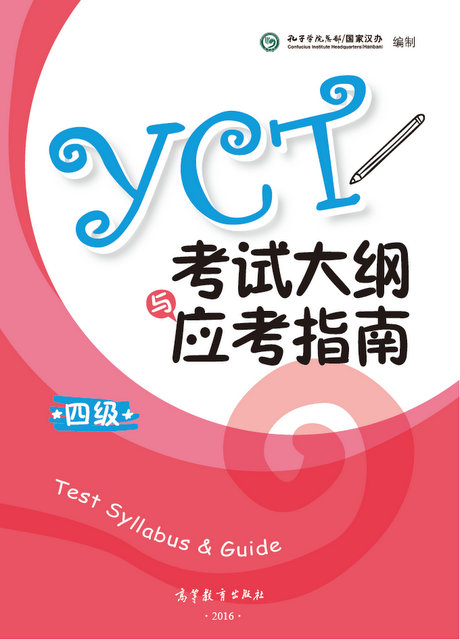 中小学生汉语考试(YCT)自2010年实施以来,更加关注汉语非第一语言的学习者综合能力的培养,多元智能发展的培养。《YCT考试大纲与应考指南》是基于《YCT考试大纲(2009版)》的一次修订。本次修订继续遵循“考教结合”的理念,根据主题式教学和任务型教学的理论及方法,以交际话题和语言任务为引领,重点描述学生在每一级别的词语、语言点限定内“能做(can do)”什么,建议在实际教学中,整体培养学习者的交际能力和语言综合运用能力。 Since its implementation in 2010, the Youth Chinese Test (YCT) has paid more attention to the cultivation of comprehensive abilities and the development of multiple intelligences for learners whose Chinese is not their first language. The YCT Syllabus and Examination Guide is a revision of the YCT Syllabus (2009 Edition). The revision continues to follow the concept of 'teaching and learning together', and is based on the theories and methods of topic-based teaching and task-based teaching, using communicative topics and language tasks as a guide. It is recommended that in practice, learners develop their communicative competence and their ability to use the language as a whole.
中小学生汉语考试(YCT)自2010年实施以来,更加关注汉语非第一语言的学习者综合能力的培养,多元智能发展的培养。《YCT考试大纲与应考指南》是基于《YCT考试大纲(2009版)》的一次修订。本次修订继续遵循“考教结合”的理念,根据主题式教学和任务型教学的理论及方法,以交际话题和语言任务为引领,重点描述学生在每一级别的词语、语言点限定内“能做(can do)”什么,建议在实际教学中,整体培养学习者的交际能力和语言综合运用能力。 Since its implementation in 2010, the Youth Chinese Test (YCT) has paid more attention to the cultivation of comprehensive abilities and the development of multiple intelligences for learners whose Chinese is not their first language. The YCT Syllabus and Examination Guide is a revision of the YCT Syllabus (2009 Edition). The revision continues to follow the concept of 'teaching and learning together', and is based on the theories and methods of topic-based teaching and task-based teaching, using communicative topics and language tasks as a guide. It is recommended that in practice, learners develop their communicative competence and their ability to use the language as a whole. -
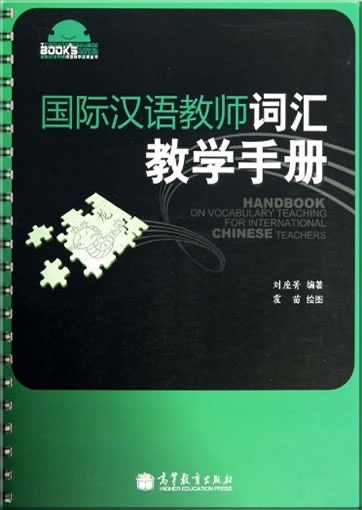 《国际汉语教师词汇教学手册》第一部分:常用词简笔画在初级阶段的词汇教学中,卡片和图画对理解词义、记忆生词、组织活动和游戏起着重要的作用。为此,《国际汉语教师词汇教学手册》将卡片和简笔画结合起来,以“词语卡片+简笔画”的形式展示80组常用词。卡片的正面是简笔画,背面是汉字、拼音和英文翻译。80组常用词包括1200多个词语,涵盖国际汉语初、中级阶段教学常见的60多个主题。 第二部分:常用词辨析同义词和近义词辨析是汉语词汇教学的重要内容,也是教师备课的重点和难点。为了帮助教师了解和熟悉教学中经常遇到的词语辨析问题及对策,《国际汉语教师词汇教学手册》对105组同义词和近义词语进行了讲解和分析。这些词语的提取均来自于教学实践,词语辨析也针对教学进行,语言力求简洁易懂,同时配有实用例句和参考练习。 第三部分:词汇教学问答《国际汉语教师词汇教学手册》对词汇教学中常见的35个问题进行了解答,为一线教师提供最实用、最贴心的教学指南。 In teaching vocabulary at the primary level, cards and drawings play an important role in understanding the meaning of words, remembering words and organising activities and games. For this reason, the Chinese Language Teacher's Vocabulary Teaching Manual combines cards and sketches to show 80 groups of commonly used words in the form of "word cards + sketches". The 80 sets of commonly used words include more than 1,200 words, covering more than 60 topics commonly taught at the beginning and intermediate levels of Chinese language teaching. Part 2: Commonly Used Words Identification and Analysis Synonyms and near-synonyms identification is an important part of Chinese vocabulary teaching, and is also a key and difficult point for teachers to prepare for lessons. In order to help teachers understand and become familiar with the problems of word identification and countermeasures frequently encountered in teaching, the Handbook for Teaching Chinese as a Foreign Language teachers' vocabulary explains and analyses 105 groups of synonyms and near-synonyms. The words are extracted from teaching practice, and the word analysis is tailored to teaching. The language is designed to be simple and easy to understand, with practical examples and reference exercises. Part Three: Vocabulary Teaching Questions and Answers The International Chinese Language Teachers' Vocabulary Teaching Manual provides answers to 35 common questions about vocabulary teaching, providing front-line teachers with the most practical and intimate teaching guide.
《国际汉语教师词汇教学手册》第一部分:常用词简笔画在初级阶段的词汇教学中,卡片和图画对理解词义、记忆生词、组织活动和游戏起着重要的作用。为此,《国际汉语教师词汇教学手册》将卡片和简笔画结合起来,以“词语卡片+简笔画”的形式展示80组常用词。卡片的正面是简笔画,背面是汉字、拼音和英文翻译。80组常用词包括1200多个词语,涵盖国际汉语初、中级阶段教学常见的60多个主题。 第二部分:常用词辨析同义词和近义词辨析是汉语词汇教学的重要内容,也是教师备课的重点和难点。为了帮助教师了解和熟悉教学中经常遇到的词语辨析问题及对策,《国际汉语教师词汇教学手册》对105组同义词和近义词语进行了讲解和分析。这些词语的提取均来自于教学实践,词语辨析也针对教学进行,语言力求简洁易懂,同时配有实用例句和参考练习。 第三部分:词汇教学问答《国际汉语教师词汇教学手册》对词汇教学中常见的35个问题进行了解答,为一线教师提供最实用、最贴心的教学指南。 In teaching vocabulary at the primary level, cards and drawings play an important role in understanding the meaning of words, remembering words and organising activities and games. For this reason, the Chinese Language Teacher's Vocabulary Teaching Manual combines cards and sketches to show 80 groups of commonly used words in the form of "word cards + sketches". The 80 sets of commonly used words include more than 1,200 words, covering more than 60 topics commonly taught at the beginning and intermediate levels of Chinese language teaching. Part 2: Commonly Used Words Identification and Analysis Synonyms and near-synonyms identification is an important part of Chinese vocabulary teaching, and is also a key and difficult point for teachers to prepare for lessons. In order to help teachers understand and become familiar with the problems of word identification and countermeasures frequently encountered in teaching, the Handbook for Teaching Chinese as a Foreign Language teachers' vocabulary explains and analyses 105 groups of synonyms and near-synonyms. The words are extracted from teaching practice, and the word analysis is tailored to teaching. The language is designed to be simple and easy to understand, with practical examples and reference exercises. Part Three: Vocabulary Teaching Questions and Answers The International Chinese Language Teachers' Vocabulary Teaching Manual provides answers to 35 common questions about vocabulary teaching, providing front-line teachers with the most practical and intimate teaching guide. -
 本系列丛书具有以下特点: 1.系统梳理,简明扼要;紧扣大纲,高效备考;名师引导,点拨技巧;本丛书严格按照“国际汉语教师证书考试”的考点撰写,重在知识点的提炼、梳理。同时,尽量用简洁明了的图表和切中要害的提示来说明重点、难点、考点、易错点,提高备考效率和“获得感”。 2.边学边练,做中得到;真题呈现,快速提高;本系列丛书的“考点指导”部分采用蝴蝶页形式编排,知识点和练习题左右对照,旨在促进读者通过“做”中学,高效、扎实地掌握每个知识点和能力点。同时,各分册的“综合练习”包含两部分内容:一部分是近两年证书考试的真题及详细的答案解析,另一部分是自编的与证书考试真题题型一致、难度相当的模拟试题,可供读者“实战演练”。 This series of books has the following characteristics. This series is written in strict accordance with the examination points of the International Chinese Language Teachers' Certificate Examination, with emphasis on the refinement and organization of knowledge points. At the same time, the book uses clear and concise diagrams and to-the-point hints to explain key points, difficulties, exam points and error-prone points, so as to improve the efficiency and "sense of access" of the preparation. This series of books is arranged in the form of butterfly pages, with the knowledge points and practice questions contrasted left and right, in order to promote the reader to learn through "doing" and master each knowledge point and ability point efficiently and solidly. The aim is to facilitate the reader to learn by doing and to master each knowledge point and competency point efficiently and effectively. At the same time, the "Comprehensive Exercises" in each fascicle contain two parts: one is the actual questions and detailed answer analysis of the certificate examinations in the past two years, and the other is the self-edited mock test questions of the same type and difficulty as the actual questions of the certificate examinations, so that readers can "practise in real life".
本系列丛书具有以下特点: 1.系统梳理,简明扼要;紧扣大纲,高效备考;名师引导,点拨技巧;本丛书严格按照“国际汉语教师证书考试”的考点撰写,重在知识点的提炼、梳理。同时,尽量用简洁明了的图表和切中要害的提示来说明重点、难点、考点、易错点,提高备考效率和“获得感”。 2.边学边练,做中得到;真题呈现,快速提高;本系列丛书的“考点指导”部分采用蝴蝶页形式编排,知识点和练习题左右对照,旨在促进读者通过“做”中学,高效、扎实地掌握每个知识点和能力点。同时,各分册的“综合练习”包含两部分内容:一部分是近两年证书考试的真题及详细的答案解析,另一部分是自编的与证书考试真题题型一致、难度相当的模拟试题,可供读者“实战演练”。 This series of books has the following characteristics. This series is written in strict accordance with the examination points of the International Chinese Language Teachers' Certificate Examination, with emphasis on the refinement and organization of knowledge points. At the same time, the book uses clear and concise diagrams and to-the-point hints to explain key points, difficulties, exam points and error-prone points, so as to improve the efficiency and "sense of access" of the preparation. This series of books is arranged in the form of butterfly pages, with the knowledge points and practice questions contrasted left and right, in order to promote the reader to learn through "doing" and master each knowledge point and ability point efficiently and solidly. The aim is to facilitate the reader to learn by doing and to master each knowledge point and competency point efficiently and effectively. At the same time, the "Comprehensive Exercises" in each fascicle contain two parts: one is the actual questions and detailed answer analysis of the certificate examinations in the past two years, and the other is the self-edited mock test questions of the same type and difficulty as the actual questions of the certificate examinations, so that readers can "practise in real life". -
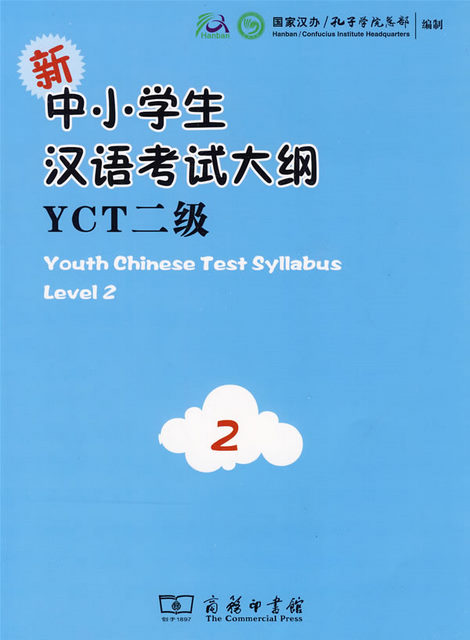 新中小学生汉语考试(YCT)是一项国际汉语能力标准化考试,考查汉语非第一语言的中小学生日常生活和学习中运用汉语的能力。新YCT分笔试和口试两部分。笔试包括YCT(一级)、YCT(二级)、YCT(三级)、YCT(四级);口试包括YCT(初级)和YCT(中级)。 YCT(二级)考查考生的日常汉语应用能力,它对应于《国际汉语能力标准》一级、《欧洲语言共同参考框架(CEF)》A1级。通过YCT(二级)的考生可以理解并使用一些非常简单的汉语词语和句子,满足具体的交际需求。 The Youth Chinese Test (YCT) is an international standardised Chinese language proficiency test that tests the ability of primary and secondary school students whose Chinese is not their first language to use Chinese in their daily lives and studies. The new YCT has two parts: a written test and an oral test. The written test includes YCT (Level 1), YCT (Level 2), YCT (Level 3) and YCT (Level 4); the oral test includes YCT (Elementary) and YCT (Intermediate). YCT (Level 2) tests candidates' ability to use Chinese in everyday life. It corresponds to the International Chinese Language Proficiency Standard Level 1 and the Common European Framework of Reference for Languages (CEF) Level A1. Candidates who pass YCT (Level 2) can understand and use some very simple Chinese words and sentences to meet specific communicative needs.
新中小学生汉语考试(YCT)是一项国际汉语能力标准化考试,考查汉语非第一语言的中小学生日常生活和学习中运用汉语的能力。新YCT分笔试和口试两部分。笔试包括YCT(一级)、YCT(二级)、YCT(三级)、YCT(四级);口试包括YCT(初级)和YCT(中级)。 YCT(二级)考查考生的日常汉语应用能力,它对应于《国际汉语能力标准》一级、《欧洲语言共同参考框架(CEF)》A1级。通过YCT(二级)的考生可以理解并使用一些非常简单的汉语词语和句子,满足具体的交际需求。 The Youth Chinese Test (YCT) is an international standardised Chinese language proficiency test that tests the ability of primary and secondary school students whose Chinese is not their first language to use Chinese in their daily lives and studies. The new YCT has two parts: a written test and an oral test. The written test includes YCT (Level 1), YCT (Level 2), YCT (Level 3) and YCT (Level 4); the oral test includes YCT (Elementary) and YCT (Intermediate). YCT (Level 2) tests candidates' ability to use Chinese in everyday life. It corresponds to the International Chinese Language Proficiency Standard Level 1 and the Common European Framework of Reference for Languages (CEF) Level A1. Candidates who pass YCT (Level 2) can understand and use some very simple Chinese words and sentences to meet specific communicative needs. -
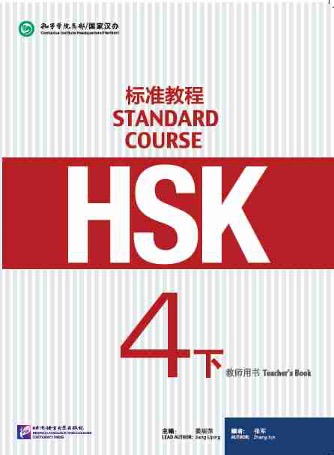 《HSK标准教程》经国家汉办授权,由北京语言大学出版社联合汉考国际(CTI)共同研发,将HSK真题作为基本素材,以自然幽默的风格、亲切熟悉的话题、科学严谨的课程设计,实现了与HSK考试内容、形式及等级水平的全方位对接,是一套充分体现“考教结合、以考促学、以考促教”理念的新型汉语教材。既适用于各国孔子学院,也适用于其他汉语教学机构和个人自学。 本书为4级下教师用书,共设10课,每课含教学内容和教学目标说明、教学步骤解析,并附练习册听力文本及参考答案。可为教师使用对应级别教程及练习册提供全方位的教学指导和有效的教学支持。
《HSK标准教程》经国家汉办授权,由北京语言大学出版社联合汉考国际(CTI)共同研发,将HSK真题作为基本素材,以自然幽默的风格、亲切熟悉的话题、科学严谨的课程设计,实现了与HSK考试内容、形式及等级水平的全方位对接,是一套充分体现“考教结合、以考促学、以考促教”理念的新型汉语教材。既适用于各国孔子学院,也适用于其他汉语教学机构和个人自学。 本书为4级下教师用书,共设10课,每课含教学内容和教学目标说明、教学步骤解析,并附练习册听力文本及参考答案。可为教师使用对应级别教程及练习册提供全方位的教学指导和有效的教学支持。Authorized by Hanban, HSK Standard Course is developed under the joint efforts of Beijing Language and Culture University Press and Chinese Testing International (CTI). With HSK test papers as its primary source, HSK Standard Course is characterized by a humorous style, familiar topics and a scientific course design. Matching the HSK test in all aspects, from the content, form to the levels, it is a series of new-type course books embodying the idea of “combining testing and teaching, and promoting learning and teaching by testing”. It is suitable for the Confucius Institutes in different countries as well as other Chinese teaching institutions and self-taught learners.
This is Teacher’s Book 4B, with altogether 10 lessons. Each lesson includes a specification of the instructional contents and objectives, an elaboration of teaching steps, and the listening scripts and reference answers for the Workbook as well. It provides teachers with all-round guidance and effective support in regard to how to use the textbook and workbook of the corresponding level.